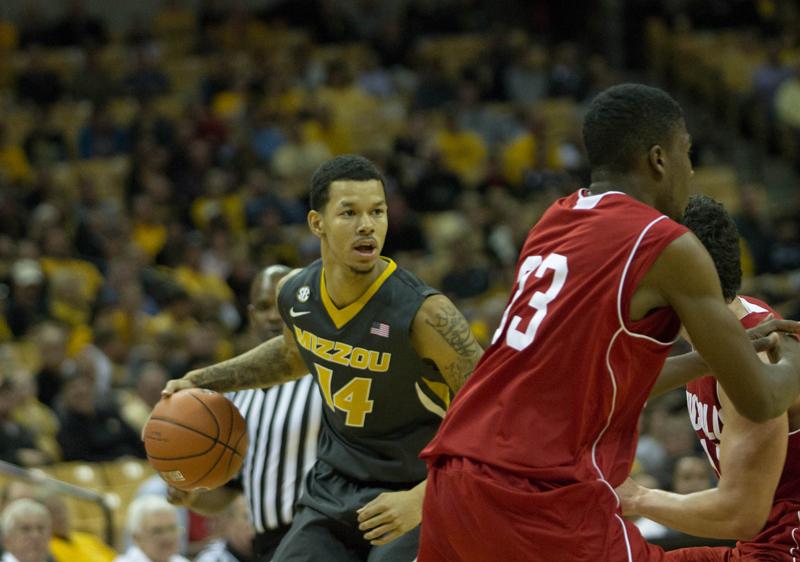
The first game of 2013 came and went. So did his Southeastern Conference debut and the start of the semester.
He played 72 minutes without scoring a single point. Some shots were wide open 3-pointers, others were desperation shots in heavy traffic. Nothing was changing for the freshman guard. No matter how many adjustments he made, he wasn’t scoring. Not off free throw shots, layups or jumpers. Junior point guard Phil Pressey could set him up with a wide open look at the basket, an ideal shot that he’s made his entire life, and he would bank it off the rim or worse — miss the basket completely.
Negus Webster-Chan was in a slump, and he was well aware of its implications. His playing time began to decrease, and soon he was being asked during media days about how his confidence was holding up when his shot was unable to find the bottom of the net.
The Canadian who earned his spot on Tigers by playing high school ball in West Virginia came to a realization. Nothing was working. His scoring drought was a far cry from his collegiate debut where he scored 11 points off 3-of-5 shooting from behind the 3-point line.
“ A lot of people miss shots,” he said. “It’s just a part of the game.”
Six games passed before Webster-Chan made a shot in 2013. A 3-pointer against Vanderbilt on Jan. 26.
“Just keep shooting the ball,” he said. “All my teammates kept saying ‘Just keep shooting. Eventually it’ll go in.’”
It’s not often that a freshman making one shot in a blowout gets recognition, but after the game, coach Frank Haith talked about the struggles Webster-Chan was having. It had gotten to the point that it was hard for him to ignore.
”Freshmen lose confidence, they do,” Haith said. “It’s not like Negus is any different than most freshmen when they go their first year and they’re playing and suddenly they lose a little confidence. They just gotta get it back. The only way to get it back is repetition.”
Webster-Chan is less than a year removed from playing for Huntington Prep, a top-50 high school basketball team in West Virginia. During his senior year, he proved himself to scouts as being an ample triple threat, averaging 10.3 points, 7.3 rebounds and 5.9 assists per game.
His first collegiate season has seen the 6-foot-7 swingman as both a starter and a benchwarmer, while initially filling in as the Tigers’ main perimeter threat before the NCAA allowed sophomore Jabari Brown to start playing. Now, with Brown becoming one of Missouri’s leading scorers, Webster-Chan has been used less as the season has progressed.
He’s started the odd game here and there, but lately Webster-Chan has seen his playing time become more spontaneous. Recently, he went from playing 23 minutes during a road loss to LSU to playing six minutes in a home win against Auburn.
“I’m never questioning my shot,” he said. “It’s just been a struggle lately.”
Earlier in the season, Webster-Chan was getting playing time, but failing to score consistently. Now, he’s been struggling to do both. After scoring a career-high 12 points on Nov. 24 against VCU, he saw his playing time begin to slowly decline. Since the start of the SEC portion of the Tigers’ schedule, Webster-Chan has played about 13 minutes per game while averaging less than a point per contest.
Pressey understands what it’s like to be in Webster-Chan’s position. Like Webster-Chan, Pressey immediately received ample playing time in his freshman year at Missouri during the 2010-2011 season.
“I’ve seen him make those shots plenty of times,” Pressey said. “I just tell him ‘keep shooting’ every time I pass it to him.”
Despite shooting struggles, Haith said because of Webster-Chan’s size he’s been able to be a good defender and rebounder for the Tigers when they need him.
“He can do all the other things, other than make a shot,” Haith said. “It’s just all about confidence. He’s a young kid, hopefully a dependable game will give him some confidence to continue growing from where he’s at.”
For now, Webster-Chan said he’s avoiding getting down about his lack of production or his constantly changing playing time. He’s not letting the rookie hype mess with his motivation. He’s only worried about showing that he belongs on the court.
“What you can always bring to the court is effort,” he said. “That show’s that you want to play. That’s the only thing you can do, show your effort on the court. Everything will take care of itself after that.”